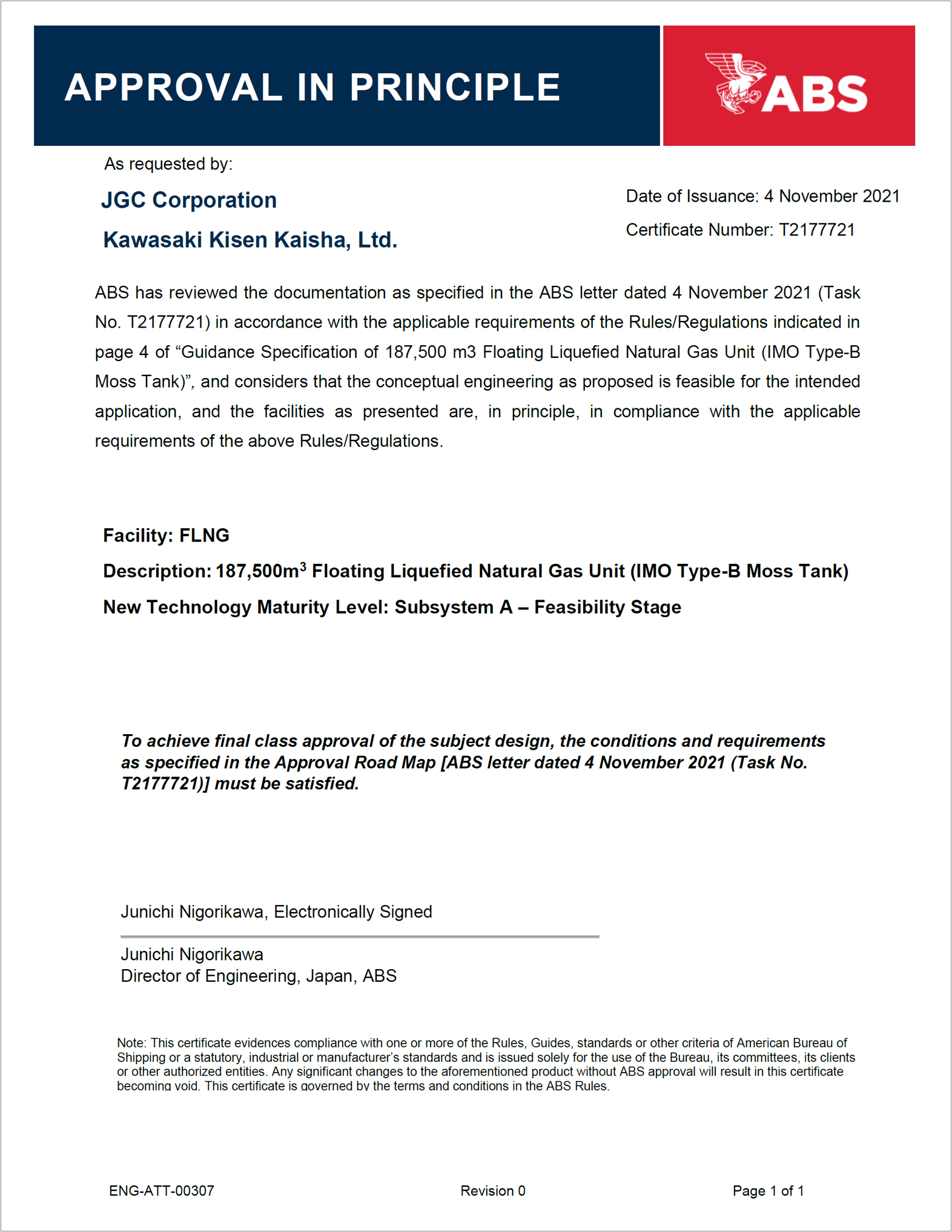News Releases 2022
Apr. 14, 2022
Design concept established for new type of FLNG hull that cuts time and cost
JGC Holdings Corporation (Representative Director, Chairman and Chief Executive Officer: Masayuki Sato) is pleased to announce it has been granted an Approval in Principle (AIP) for the design by the American Bureau of Shipping establishing a new-concept floating liquified natural gas (FLNG) hull design that incorporates existing storage tanks from LNG carriers. The development is a joint initiative with JGC Corporation (Representative Director and President Farhan Mujib, hereafter "JGC Global") and Kawasaki Kisen Kaisha (President & CEO Yukikazu Myochin, hereafter '"K" Line').
An FLNG, floating LNG production, storage and offloading facility, eliminates the costs involved in laying a pipeline for transporting gas from the gas field. The FLNG can also be redeployed to other offshore reservoirs once a gas field has been exhausted, which makes it suitable for remote small and midsize subsea gas field developments that would not be profitable for a land-based LNG complex. There are numerous stranded offshore gas fields all over the world and, given the rising demand for energy among emerging economies in particular, there will be a switch to LNG as a relatively eco-friendly fossil fuel. That is why JGC Global is contributing to several FLNG commercialization projects, particularly in Asia and Africa.
Currently, seven1 (7) FLNG facilities exist globally, including those in transit and under construction. However, it is essential to identify technological solutions to the challenges of FLNG, including the matter of counteracting wave motion, the need for a very compact structure, and safety. The challenge is to overcome these while capping construction costs.
The key components of an FLNG facility are the hull, which contains the LNG storage tanks, as well as the production and liquefaction units on the topside. The LNG storage tanks in the hull require very costly cryogenic materials able to withstand temperatures as low as -162°C. Welding together these materials requires special technology, which means that FLNG facilities can only be built by a small number of shipbuilders. This leads to high costs and long delivery times.
Meanwhile, since the first LNG carrier was built in the 1970s, LNG usage has increased to the point that there now exist 600 carriers globally. However, in recent years some LNG carriers among this fleet have been replaced by newer, more energy-efficient ships with larger carrying capacity, leaving older carriers to languish in port.
JGC Global and "K" Line saw an opportunity in this older generation of LNG carriers and, with the backing of Japan's Ministry of Land, Infrastructure, Transport and Tourism,2 the conceptual design of new type of FLNG hull was established. This involves transferring and reusing the LNG storage tanks from existing spherical tank (Moss tank) carriers in the hulls of new FLNG facilities. The design has gained Approval in Principle (AIP)3 from one of the world's leading ship classification organizations, the American Bureau of Shipping (ABS), as a significant step towards its realization.
Transferring and reusing the spherical Moss tanks from existing LNG carriers means there is (1) no need to build made-from-new new storage tanks from expensive cryogenic materials, reducing the cost of hull construction, and (2) as a result, there is a wider choice of shipbuilding yards able to construct the FLNG hulls. This is expected to reduce construction time and cost, notably providing a safe and quality option for converted FLNGs for application in the high seas and in harsh operation environments.
The JGC Group is a pioneer in the FLNG space, providing life-cycle services for project development, including working on engineering, procurement, construction, installation and commissioning (EPCIC) of two FLNGs, as well as supporting commissioning (test operation). Further, development partner "K" Line has been a player in the LNG carrier business for many years, accumulating a wealth of experience in LNG carrier construction and operation. "K" Line has also performed offshore projects including operation of FPSO (floating production storage and offloading facilities).
LNG is seen as a green and low-carbon fuel compared to other fossil fuels. Demand is forecast to grow strongly against the backdrop of increasing demand from developing countries. In addition to its experience and track record, the JGC Group intends to build on its development achievements to deliver to its clients highly competive and reliable FLNG facilities. The company is moving aggressively to further build its order book.
| Project name | Company | Status | |
| 1 | Prelude FLNG | Shell et al. |
Under operation in Australia. JGC Group-financed commissioning |
| 2 | PFLNG Satu | Petronas |
Under operation in Malaysia JGC Group supports operation |
| 3 | PFLNG Dua | Petronas |
Under operation in Malaysia. JGC Group executed EPCI |
| 4 | Eni Coral South FLNG | ENI et al. |
Preparing for operation in Mozambique. JGC Group is undertaking EPC |
| 5 | Exmar FLNG | Exmar | Temporarily off line looking for new deployment |
| 6 | Kribi FLNG | Golar LNG | Under operation in Cameroon |
| 7 | Gimi FLNG | Golar LNG | Under construction |
2. The project falls under the Marine Resources Development Technology Research and Development Program.
3. Approval in Principle means ABS considers that the conceptual engineering as proposed is feasible for the intended application, and the facilities as presented are, in principle, in compliance with the applicable requirements of the applicable Rules/Regulations..
The Approval in Principle granted by the American Bureau of Shipping
